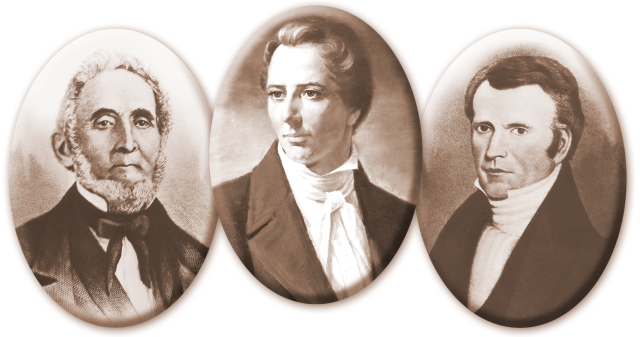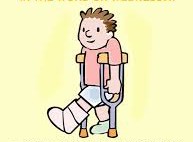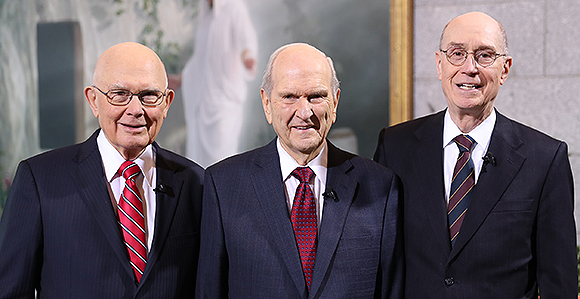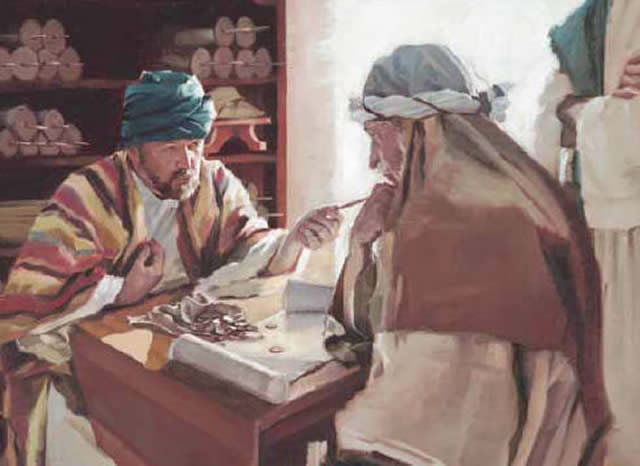To accompany your Come Follow Me study for July 21-27
In addition to reading these three sections and the related Come Follow Me material, you may want to read:
- Chapter 30: Doctrine and Covenants 81–83 (churchofjesuschrist.org)
- Joseph Smith’s Revelations, Doctrine and Covenants 81 (churchofjesuschrist.org)
- Joseph Smith’s Revelations, Doctrine and Covenants 82 (churchofjesuschrist.org)
- Joseph Smith’s Revelations, Doctrine and Covenants 83 (churchofjesuschrist.org)
- “Newel K. Whitney and the United Firm,” Revelations in Context, 142-147
- “Jesse Gause: Counselor to the Prophet,” Revelations in Context, 155-57
You may also enjoy the following video:
If you would like a Kahoot game related to these sections which you could use with your family or your class, click here: https://create.kahoot.it/share/doctrine-and-covenants-81-83/1f35fb06-dd74-475e-b98e-c938252b51e8. To use it with a group, after clicking on this link, you will need to log into Kahoot, creating a free account if you have not done so previously, then click on the blue “Host Live” button or the gray “Assign” button, depending on how you wish to use the Kahoot. Some of the Kahoot questions may presuppose that the player has read through the suggested answers to the following Points to Ponder and at least has browsed the Institute student manual as well.
1. In view of the Lord’s declaration in 82:5 that “What I say unto one I say unto all,” what do you consider the ten most personally applicable verses in D&C 81-83, and why? (If you pick more than ten, try to reduce your list to your ten favorites.)

2. How do you explain our publishing D&C 81 with Frederick G. Williams’ name inserted, when the revelation was originally given to Jesse Gause? Didn’t Williams deserve his own revelation rather than this already “used” one?

3. Translate the more obscure portions of 81:5 into language a Primary child could understand. What are the first five possible applications of the passage that come to your mind?

4. What is the role of a good counselor in a presidency? (81:1,3.) What mistakes could a counselor make if he didn’t understand that role?

5. What does it mean that everyone’s talents are to be “cast into the Lord’s storehouse, to become the common property of the whole church”? (82:18) Does that mean that we all own part of the Tabernacle Choir, a piece of David Archuleta, and share equally in ownership of the Piano Guys and other talented people in the Church?

6. Your understanding of D&C 82:22 will depend somewhat on your understanding of the Parable of the Unjust Steward in Luke 16:1-12, one of the most puzzling of the Savior’s parables to most people. What does it mean to “make friends with the mammon of unrighteousness”? What is the antecedent to the pronoun “they” in D&C 82:22?

7. How would you explain 82:19 to a puzzled member who thought it meant they should try to make loans to other ward members and neighbors and charge an appropriate fee?

8. What is the significance of D&C 83? Do men also have claim on their wives and parents on children, or it a one way street? Does this section reveal eternal principles, or does it reflect 19th century culture and circumstances which no longer exist? Does the section mean parents owe children an education? What is “of age”?

Possible answers to Points to Ponder in Doctrine and Covenants 81-83
1. In view of the Lord’s declaration in 82:5 that “What I say unto one I say unto all,” what do you consider the ten most personally applicable verses in D&C 81-83, and why? (If you pick more than ten, try to reduce your list to your ten favorites.)
Your choice. Mine might be:
- 81:3—A reminder to pray always, vocally, in the heart, in public, in private, and in our ministry
- 81:5—A reminder of our ministering responsibility to “succor the weak, lift up the hands which hang down, and strengthen the feeble knees.”
- 82:1—Our forgiveness by the Lord is conditioned upon our forgiving others.
- 82:3—Since I’ve been so blessed, I’m under obligation to do more than those less favored.
- 82:5—The scriptures, though given to others originally, have much in them that I can and should apply.
- 82:5—It is important to be vigilant, as Satan would want to lead us astray.
- 82:10—If we keep the Lord’s commandments, He is bound to bless us.
- 82:14—Zion must increase in holiness, not just in numbers or strength as men measure it.
- 82:17—We are to be equal, or to have equal claim on Zion’s resources
- 82:19—Every man is to seek the welfare of his neighbor
2. How do you explain our publishing D&C 81 with Frederick G. Williams’ name inserted, when the revelation was originally given to Jesse Gause? Didn’t Williams deserve his own revelation rather than this already “used” one?
Mission calls are also given through inspiration from heaven, but the First Presidency doesn’t find it necessary to create new wording for each one. The same instructions that were suitable for Jesse Gause were perfectly fine for Frederick G. Williams, who would fill the same position and have the same responsibilities.
3. Translate the more obscure portions of 81:5 into language a Primary child could understand. What are the first five possible applications of the passage that come to your mind?
Maybe something like this would be easier for young folks to understand: “Do what the Lord has asked you to do. Especially help those who are weak or discouraged or need whatever you can give them or do for them.”
Applications that come to my mind include:
- Help those family members who are going through a rough time.
- Reach out to friends that you know need your help.
- Look for others in the ward or in your neighborhood who need to be cheered up or helped in any way.
- Do an especially good job with your ministering assignments.
- Magnify your calling in the Church without aspiring to “higher” positions.

4. What is the role of a good counselor in a presidency? (81:1,3.) What mistakes could a counselor make if he didn’t understand that role?
A good counselor should:
- Seek divine guidance to know how to best help the president.
- Cheerfully accept and volunteer for assignments, complete them, and report back.
- Proactively bring matters to the attention of the president which need the presidency’s attention and offer proposed solutions to the problems which he identifies.
- Offer the best counsel he can to the president when a matter is under discussion. At this stage, it is appropriate to speak energetically and offer reasons why the counselor feels a given decision would be best.
- Accept the president’s decision, once he makes it and cheerfully do his best to make it work.
Mistakes a counselor could make would include:
- Thinking that presidencies in the Church are supposed to be democracies in which two counselors can expect to outvote one president.
- Fighting against a decision the president has made and with which the counselor disagrees.
- Trying to put the president in a bad light before others.
- Dragging his feet and doing only the bare minimum asked of him.
- Being a “yes” man, trying to support a bad idea put forward by the president but before he had announced a decision and asked for the sustaining vote of the counselors.
- Being too timid to speak clearly and forcefully when a matter is under discussion.
- Being satisfied with identifying problems without offering proposed, well-thought-out solutions
5. What does it mean that everyone’s talents are to be “cast into the Lord’s storehouse, to become the common property of the whole church”? (82:18) Does that mean that we all own part of the Tabernacle Choir, a piece of David Archuleta, and share equally in ownership of the Piano Guys and other talented people in the Church?
In the Bible, a “talent” was a weight equivalent to about 75 pounds. Thus, a talent of gold would be enough to make its owner considered rich. So “talents,” in D&C 82:18, simply meant financial resources. Under the law of consecration, all were to deed over their property to the Church and receive a stewardship back in return to manage.
6. Your understanding of D&C 82:22 will depend somewhat on your understanding of the Parable of the Unjust Steward in Luke 16:1-12, one of the most puzzling of the Savior’s parables to most people. What does it mean to “make friends with the mammon of unrighteousness”? What is the antecedent to the pronoun “they” in D&C 82:22?
In the Parable of the Unjust Steward, a rich man had a steward, or employee with some authority, who was either incompetent or crooked in his assignment and was on the verge of being fired. Realizing he needed to provide for his financial future after losing his current position, the steward went to those who owed his master money and, while still having authority to make such arrangements, significantly reduced the amount of their debt, thus currying favor with them so they would help him out after he got fired. When the master found out what the “unjust steward” had done, he “commended” him, “because he had done wisely.” This doesn’t mean the master approved. It’s more like he said, “You clever character! I needed to have fired you earlier. But you outsmarted me. You cheated me, but you sure took care of your own financial future!”
Jesus, after telling the parable, summarized, “the children of this world are in their generation wiser than the children of light.” (Luke 16:8.) In other words, worldly people in general are often more concerned about providing for their future financial security than Church members are about providing for their eternal future. He then used the same phrase which we find in D&C 82:22: “Make to yourselves friends of the mammon of unrighteousness; that when ye fail, they may receive you into everlasting habitations.” The Savior seemed to be telling His followers to use money to make eternal friends—to help further missionary work, assist the poor and needy, etc., so that they’d have some friends when they got to heaven.
In D&C 82:22, the idea seems to be similar, but with more immediate and temporal goals—the saints were to use money (the “mammon of unrighteousness” in ways which would gain them friends, but friends here and now with their neighbors, so the neighbors would not be inclined to want to “destroy” them.
7. How would you explain 82:19 to a puzzled member who thought it meant they should try to make loans to other ward members and charge an appropriate fee?
“Interest,” here, of course, has nothing to do with loans or finances. The Lord is simply saying we should love our neighbors as ourselves and should always be “interested” in their happiness and success. I’ll bet you already knew that!
8. What is the significance of D&C 83? Do men also have claim on their wives and parents on children, or it a one way street? Does this section reveal eternal principles, or does it reflect 19th century culture and circumstances which no longer exist? Does the section mean parents owe children an education? What is “of age”?
The Family: A Proclamation to the World, states: “By divine design, fathers are to preside over their families in love and righteousness and are responsible to provide the necessities of life and protection for their families. Mothers are primarily responsible for the nurture of their children. In these sacred responsibilities, fathers and mothers are obligated to help one another as equal partners. Disability, death, or other circumstances may necessitate individual adaptation.”
This indicates that fathers do indeed, by divine mandate, normally have the primary responsibility to provide the physical necessities for their wives and children, just as mothers are usually better suited by anatomy and temperament to do the best job of nurturing small children. However, in both responsibilities, as in all others, “fathers and mothers are obligated to help one another as equal partners,” and “individual adaptation” is not only permissible but expected, according to circumstances.
No definition is given as to what “of age” would mean, but presumably it simply means “until they are old enough to fend for themselves.” While in the spirit of this section and of the family proclamation, parents would be expected to encourage children to get all the education they could, that does not mean they are required to pay for unlimited years of university training while the child does nothing. Part of his education may well be to learn how to work to pay for much, if not all, of the cost of his own schooling.
